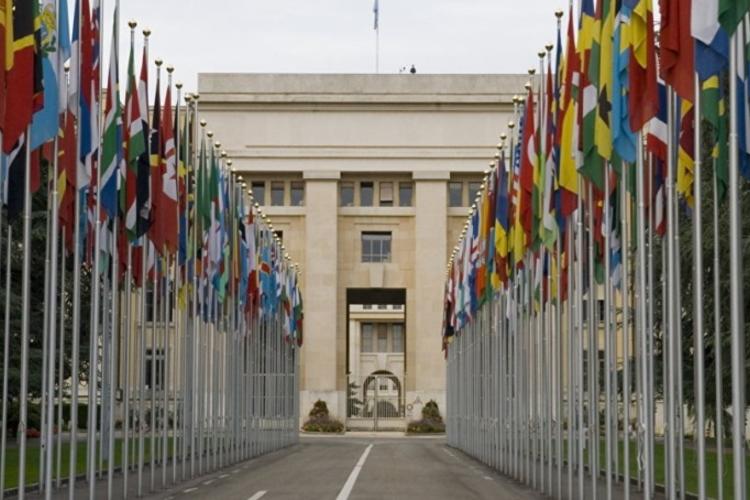Pertaining to the results of the 39th round of the Geneva International Discussion
March 28-29, 2017 saw a regular round of the Geneva International Discussions on Security and Stability in Transcaucasia established in accordance with the agreements dated August 12, 2008 and September 8, 2008. Official mission from the Republic of South Ossetia, headed by Murat Dzhioev, the Minister of Foreign Affairs of the Republic of South Ossetia, missions from the Republic of Abkhazia, Georgia, the Russian Federation and the USA as well as representatives of the EU, the UN and the OSCE took part in negotiations.
The discussions were held in two working groups: on security and humanitarian issues.
During the round special attention in working group I was drawn to discussion of ways of maintaining security and stability in regions and on non-use of force by Georgia against South Ossetia and Abkhazia.
The version of a brief statement of the participants on commitment to the principle of non-use of force, which had been prepared by South Ossetian delegates, was supported nearly by all participants; however, adoption of such a statement again was banned because of the non-constructive position of Georgian delegation.
South Ossetian and Abkhazian parties expressed serious concern about security and stability in the face of ongoing Georgia-NATO rapprochement and NATO infrastructure being built on territory of Georgia against the background of Georgian authorities’ ongoing aggressive rhetoric in relation to South Ossetia and Abkhazia.
Detailed conversation on security and stability about South Ossetian-Georgian and Abkhazian-Georgian borders took place. As for the situation about South Ossetian-Georgian frontier, it was characterized as rather stable.
South Ossetian participants noted that the informational propaganda tactics of Georgia in relation to Georgian-South Ossetian frontier had been changing recently. Refusing of cooperation with South Ossetian party in delimitation and demarcation process, Georgian authorities more and more often present detentions of the frontier violators by border guards as “kidnappings” succeeded by “ransoms”. The provocative character of regular “guided tours” to the state border between the Republic of South Ossetia and Georgia, organized for foreign delegations, was emphasized as well.
The participants of the Discussions noted positive results of meetings organized about South Ossetian-Georgian frontier upon the IPRM on monthly basis. It was highlighted that the attempts of Georgian party to politicize the issues discussed at the IPRM meetings were inconsistent with mandate of the IPRM. The productivity of the “hot line” organized upon the Mechanism was emphasized as well.
As an essential part of general security and humanitarian situation, issues related to the search of citizens of the Republic of South Ossetia, kidnapped by representatives of Georgian security agencies and lost on territory of Georgia, were discussed as well. During the discussion videos, proving that citizens of the Republic of South Ossetia missed in 2008 were kept by force by Georgian security agencies, were demonstrated. South Ossetian delegates expressed hope that Dusan Ignjatovic, the independent international expert invited by the OSCE, would continue his work in search of the Ossetians in 2017.
Generally, the atmosphere at the Discussions was aggravated due to the Resolution on Cooperation with Georgia adopted by the United Nations Human Rights Council at the 34th session held on March 24 in Geneva. Written under orders of Tbilisi, the wording of the document contains absurd accusations against South Ossetia in alleged violations of rights of Georgian minority. South Ossetia representatives characterized the resolution adopted by the UNHCR as an unskillful attempt to discredit the statehoods of South Ossetia and Abkhazia in the international community’s eyes.
South Ossetian participants once again drawn attention to the high chance that there is correlation between the microbiological research conducted by Richard Lugar Center for Public Health and the increased incidence of serious diseases among people and animals, caused by new viruses strains.
During the discussion on historical-cultural heritage attention was drawn to the problem of preservation of Ossetian historical-cultural monuments located on territories which are under Georgian control in Tyrsygom and other parts of Eastern Ossetia, as Georgian authorities ban the Ossetians, who had been driven out from there, from visiting those places. Once again South Ossetia participants called for returning from Georgia the icon-triptych that had been stolen in 1991.
The problem of refugees wasn’t discussed within the round, as renewal of negotiations on this subject would become possible only if Georgia gives up turning artificially the problem into a political issue.
Next meeting in Geneva is scheduled for June 2017.
March 30, 2017, Geneva
